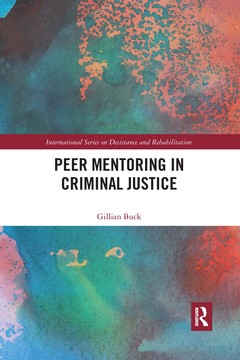Peer Mentoring in Criminal Justice International Series on Desistance and Rehabilitation Series
Auteur : Buck Gillian

Peer mentoring is an increasingly popular criminal justice intervention in custodial and community settings. Peer mentors are community members, often with lived experiences of criminal justice, who work or volunteer to help people in rehabilitative settings. Despite the growth of peer mentoring internationally, remarkably little research has been done in this field. This book offers the first in-depth analysis of peer mentoring in criminal justice. Drawing upon a rigorous ethnographic study of multiple community organisations in England, it identifies key features of criminal justice peer mentoring. Findings result from interviews with people delivering and using services and observations of practice.
Peer Mentoring in Criminal Justice reveals a diverse practice, which can involve one-to-one sessions, group work or more informal leisure activities. Despite diversity, five dominant themes are uncovered. These include Identity, which is deployed to inspire change and elevate knowledge based on lived experiences; Agency, or a sense of self-direction, which emerges through dialogue between peers; Values or core conditions, including caring, listening and taking small steps; Change, which can be a terrifying and difficult struggle, yet can be mediated by mentors; and Power, which is at play within mentoring relationships and within the organisations, contexts and ideologies that surround peer mentoring. Peer mentoring offers mentors a practical opportunity to develop confidence, skills and hope for the future, whilst offering inspiration, care, empathy and practical support to others.
Written in a clear and direct style this book will appeal to students and scholars in criminology, sociology, cultural studies, social theory and those interested in learning about the social effects of peer mentoring.
1.Introduction: Peer Mentoring in Criminal Justice 2.The penal voluntary sector, peer mentoring, and desistance from crime 3.Theorising peer mentoring as a critical relational practice: pedagogy, identity and collective politicisation 4.The research field 5.The importance of identity to peer mentoring 6.Agency, action and acknowledgement in peer mentoring 7.The Values and ‘Core Conditions’ of Peer Mentoring 8.The terror, complexity and limits of change 9. The hidden power dynamics of peer mentoring 10.Conclusion
Gillian Buck is Senior Lecturer in Social Work at the University of Chester. Her research interests include peer led services, criminal justice, youth justice and the voluntary sector. Before working in research and teaching, Gill spent eight years as a Social Worker in a youth offending team.
Date de parution : 06-2022
15.6x23.4 cm
Date de parution : 03-2020
15.6x23.4 cm
Mots-clés :
Peer Mentoring; Desistance; UK Voluntary Sector; Rehabilitation; Independent Custody Visitors; Penal voluntary sector; UK Probation; Interactionist theory; Peer Mentoring Project; Working with offenders; Successive UK Government; Youth mentoring; Peer Navigators; Offender Supervision; Group Peer Mentoring; Human Suffering; Youth Justice Social Worker; St Giles Trust; National Probation Service; Functional Assessments; Statutory Providers; User Voice; Mentoring Coordinator; Pedagogical Precept; Mimetic Desire; Desistance Research; Politicisation Precept; Care Leavers; Gang Injunctions; Past Tense; Formal Peer Mentor



